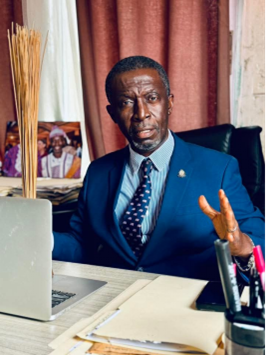The Albert Porte Street Lecture Series, an initiative spearheaded by former Liberian presidential candidate and human rights lawyer, Cllr. Tiawan Saye Gongloe, has been inaugurated in Monrovia, Liberia. The series aims to address a perceived thirst for knowledge among young Liberians about their nation’s history, legal framework, and political landscape. Launched at the Center for the Exchange of Intellectual Opinion (CEIO), the inaugural lecture drew a diverse audience of intellectuals, academics, students, activists, and ordinary citizens. Cllr. Gongloe’s initiative emphasizes the importance of accessible public education, using the street as a platform to disseminate crucial information and foster informed citizenry.
Cllr. Gongloe’s inaugural lecture focused on key aspects of Liberian history, particularly the arrival and settlement of the first group of African American settlers sponsored by the American Colonization Society (ACS). He highlighted the historical complexities surrounding the exact date of their arrival, traditionally commemorated on December 19, 1821. While acknowledging the significance of December 1821 in the settlement process, involving activities like land purchases and the arrival of agents and ships like the Elizabeth and Nautilus, he questioned the accuracy of December 19th as the definitive arrival date of the settlers on Liberian shores. His research indicates that while some narratives, particularly family histories, cite this date, authoritative historical sources do not corroborate it.
The lecture further delved into the land acquisition process at Cape Mesurado, detailing the negotiations between ACS representatives, Dr. Eli Ayers and Lieutenant Robert F. Stockton, and local indigenous leaders, including prominent figures like Zolu Duma, also known as King Peter. The agreement involved the purchase of Cape Mesurado, including the headland and surrounding areas, as well as Dozoa Island (also known as Perseverance or Providence Island). Cllr. Gongloe emphasized the nature of the transaction, which involved trade goods, supplies, rum, guns, gunpowder, tobacco, and trinkets, rather than cash. The estimated value of these goods was around US$300. He also addressed inconsistencies in historical accounts regarding the precise size of the acquired land, with some sources citing 40 miles and 150 acres along the coast.
The Albert Porte Street Lecture Series, named in honor of the late Liberian social justice activist and pamphleteer, represents a significant contribution to public discourse and civic education in Liberia. By making historical and political information readily accessible to the public, Cllr. Gongloe aims to empower citizens with the knowledge necessary for informed participation in democratic processes and national development. The series acknowledges the critical need for continuous learning and engagement with historical narratives to foster a deeper understanding of contemporary societal challenges.
The series’ focus on Liberian history and politics serves as a critical platform for examining pivotal moments in the nation’s past, fostering open dialogue about its complexities, and promoting a more nuanced understanding of its present-day realities. By exploring these critical junctures, the lectures aim to equip citizens with the historical context required to navigate current political and social issues, contributing to a more informed and engaged citizenry. This approach recognizes that a strong understanding of history is essential for effective civic engagement and the promotion of democratic values.
Furthermore, the Albert Porte Street Lecture Series serves as a vital bridge between academia and the public, bringing intellectual discussions out of the confines of universities and institutions and into the streets, making them accessible to a wider audience. This accessible format encourages greater participation from diverse segments of society, fostering a more inclusive and democratic conversation about the nation’s past, present, and future. By taking place in the public sphere, the lecture series underscores the importance of public intellectualism and its role in shaping a more informed and engaged citizenry.














